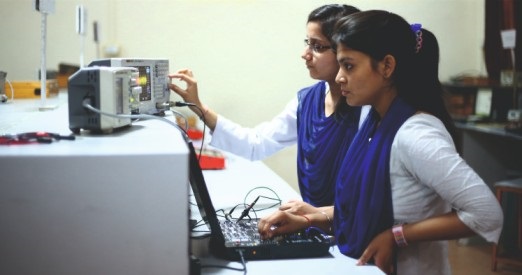Can you imagine a life without TV or mobile phones? It seems next to impossible as every place on this planet is holding the part of electronics and communication. Electronic goods that we see and use every day belong to Electronics and Communication (EC) Engineering, which is indulged in the process of their designing, manufacturing and maintenance. A Diploma in EC Engineering is the best way to mend your focus on job oriented course, which is the new wrinkle in the town. This blog deals with some fascinating career choices that one can opt for after a diploma in EC.
Probable career opportunities post Diploma in Electronics and Communication Engineering
Baffled about what to do next after a diploma in Electronics and Communication Engineering? No need to take much pain as there are ample numbers of career options in multiple arenas like wireless communications, mobile technologies, biotechnology, biomedical engineering and nanotechnology. Electronics and communication engineering is a three-year diploma course, and this time span is worth enough to gain adequate knowledge and skills in the relevant field. Let’s understand multiple career options after the diploma course –
Be a part of private companies
Private sector units in the areas like IT, electronics, power, utilities, automotive, telecom, transport, manufacturing and construction die for the professionals carrying job-oriented skills in electronic and communication engineering. The well-acclaimed companies like TCS, Wipro, Honeywell, TISCO and LSI Logic admire the recruitment of engineers who are ready to play the game of skills and relevant experience. If you are able to handle the pressure of private sector companies, be ready to earn good salaries and perks too.
Get stability in Government sector jobs
If you are under the shadow that a diploma course is not an esteemed one, get a reality check as government units like SAIL, NTPC, NTRO, DRDO, DMRC, SSC, BSNL and Railway need employees who can handle the projects efficiently and smartly. Diploma holders can apply for various government examinations to grab jobs in this sector. Most of you must carry a notion that electronic engineers in PSUs get lower salaries and perks, which is a pretty valid fact if we compare it with private units, but there are other aspects that can be alluring, like job security, social status and stability.
Get command over the programming language
A Diploma in EC can be of good value if you add some computer hardware courses to it just to find a place in the IT sector. These include Computer hardware courses or Programming language courses. Opting for such professional programs can enhance your value as an EC engineer, and you can look forward to a fantastic career. Moreover, adding this feather to your cap can make you expand your wings in IT sector jobs as well.
Advanced Studies
Students who are willing to put their foot forward for further studies in electronics and communication can opt for post-graduation and PhD courses. They can grow their career scope as a professor in any engineering college or start working as a researcher. For instance, after pursuing a diploma in EC, what if your interest might get switched to gaining further knowledge in the subject instead of inclining towards alluring private sector jobs? You would certainly opt for advanced studies in Electronics and enjoy the broader perspective of learning.
Other vocational programs
Give a decent kick to your resume after your diploma by opting for many vocational courses that are job inclined. The current market scenario allows every single job aspirant to develop smart skills that are pretty adequate from an employer’s perspective. Knowing everything about the subject cannot be achieved, and companies never ask you for this; rather, they expect professionals to be practical in their approach and work smartly.
Become an entrepreneur
Starting your own business is indeed a Herculean task, but if you have done diploma in Electronics and Communication from a reputed institute, half of your work is done. Though it is quite challenging to run a start-up without any business expertise, this field has good income potential. For instance, if you start a manufacturing company of electronic goods, you need to focus on multiple business stages, right from the designing to the manufacturing of the final product and its maintenance.
After all this discussion, if you get allured to embark on your career in electronics and communication and want to pursue a diploma course, count on GLA University, which is a well-renowned NAAC A+ Accredited University in Mathura. It has a sound infrastructure with all basic and advanced facilities. The faculty at GLA is a boon for the students as it contains well-experienced and certified professors, academic counsellors, subject experts, mentors and researchers. The university conducts workshops, seminars, activities and company visits for the students to get hands-on experience in the relevant field of electronics and communication.














